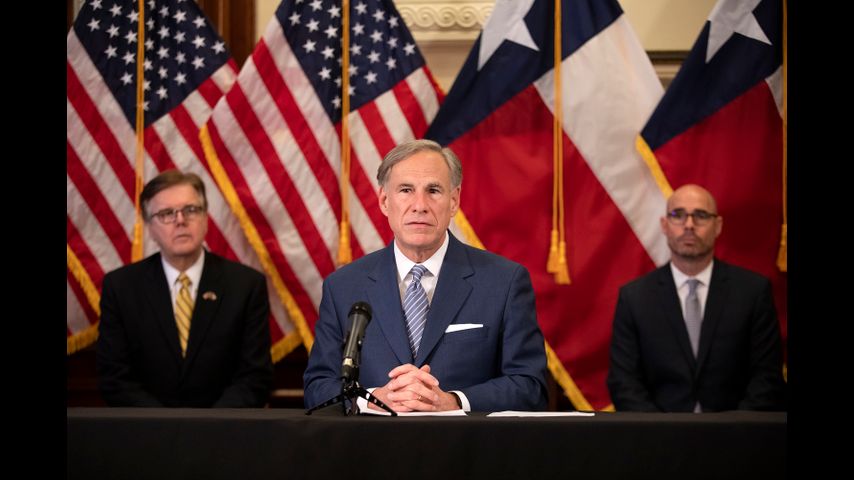Texas Gov. Greg Abbott instructs state agencies to trim budgets by 5% to prepare for 'economic shock'
Texas’ top Republican leaders asked certain state agencies and higher education institutions Wednesday to “submit a plan identifying savings” to reduce their budgets by 5% for the current biennium — an attempt to tighten financial belts amid the economic fallout from the coronavirus pandemic.
Those entities, according to a May 20 letter from Gov. Greg Abbott, Lt. Gov. Dan Patrick and House Speaker Dennis Bonnen, have until June 15 to submit their plans to the Legislative Budget Board and the governor’s office.
The letter also identified a number of agencies that are exempted from the 5% reduction “given the importance of the state’s response to COVID-19 and the continuity of critical government functions.”
Among those agencies: the Texas Department of State Health Services, the Texas Workforce Commission, the Texas Military Department and the Texas Department of Public Safety. The letter says that funding for school districts, Child Protective Services and behavioral health service programs is also exempted from the request for reductions. The agencies and programs included in the exemptions make up a majority of the state's general revenue funding, according to the Legislative Budget Board.
"We are confident that Texas will get back to work and continue leading the nation in job growth, economic innovation, and business creation," the letter from the three officials reads. "However, it will take months until we know the true extent of the economic ramifications of COVID-19, and how combating this virus will impact state finances. To prepare for this economic shock, we must take action today to ensure that the state can continue providing the essential government services that Texans expect."
The trio suggested that agencies consider "cost saving strategies," such as "foregoing any capital expenditures that can be deferred, any avoidable travel expenditures, any administrative expenses that are not mission critical, and keeping unfilled any open positions that are not essential to the COVID-l9 response."
Last month, Bonnen, an Angleton Republican who is retiring at the end of his term, sent a memo to Abbott and Patrick suggesting that state agencies “identify and execute” 5% budget cuts. Bonnen wrote that “a small 5% course correction now, with nearly 17 months for implementation … is a far more achievable goal than having to attempt a much larger cut with a much shorter window for execution."
Other lawmakers and Republican officials have also suggested that action be taken sooner rather than later during the legislative interim in an attempt to offset some of the economic devastation caused by the pandemic before the Legislature reconvenes for its regular session in January.
State Sen. Jane Nelson, a Flower Mound Republican who chairs the Senate Finance Committee, wrote in a recent letter responding to one of her GOP colleagues that “it is both reasonable and necessary for agencies to reduce their FY 20-21 spending — and to start immediately.” Nelson also suggested that, as she meets with state agencies to review future appropriation requests, she will “begin at ZERO.”
Meanwhile, Comptroller Glenn Hegar announced at the beginning of the month that Texas’ sales tax revenue — the state’s largest source of funding — had dropped about 9% from what the state collected the same month last year and warned that the figure would continue to “show steeper declines” in the coming months as data continues to come in.
To that end, Abbott, Patrick and Bonnen made clear in Wednesday's letter that "it may become necessary to make additional budget adjustments" as the state's revenues continue to come into focus. Hegar, who is expected to provide his revised fiscal forecast in July, has already said that the current state budget will be billions of dollars out of balance.
Disclosure: The Texas Comptroller of Public Accounts has been a financial supporter of The Texas Tribune, a nonprofit, nonpartisan news organization that is funded in part by donations from members, foundations and corporate sponsors. Financial supporters play no role in the Tribune's journalism. Find a complete list of them here.
The Texas Tribune is a nonpartisan, nonprofit media organization that informs Texans — and engages with them – about public policy, politics, government and statewide issues.





